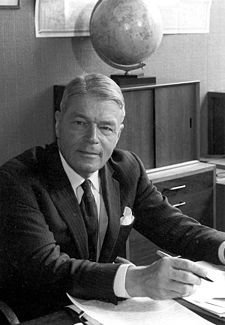- Cyril Clarke
-
Cyril Clarke 
Born 22 September 1907
Leicester, EnglandDied 21 November 2000 (age 93) Fields Medicine and genetics Institutions Liverpool University Alma mater Gonville and Caius College and Guy's Hospital Known for Pioneering work on prevention of Rh disease, and genetics of lepidoptera Notable awards Albert Lasker Award for Clinical Medical Research (1980) Spouse Lady Frieda (or Féo) Clarke (m. 1934-1998) Sir Cyril Astley Clarke KBE, FRCP, FRCOG, (Hon) FRC Path, FRS[1] (22 August 1907–21 November 2000) was a British physician, geneticist and lepidopterist. He was honoured for his pioneering work on prevention of Rh disease of the newborn, and also for his work on the genetics of the Lepidoptera (butterflies and moths).[2]
Contents
Biography
Cyril Clarke was born on 22 August 1907 in Leicester, England and received his school education at Wyggeston Grammar School for Boys, Leicester and at the independent Oundle School near Peterborough. His interest in butterflies and moths began at school. His studied natural science at Gonville and Caius College, University of Cambridge, graduating in 1929, and then medicine at Guy's Hospital, London, graduating in 1932. During the Second World War he worked as a medical specialist in the Royal Naval Volunteer Reserve. After the war Clarke worked as a registrar at the Queen Elizabeth Hospital in Birmingham and then as Consultant Physician at the United Liverpool Hospitals. In 1963 he was appointed Director of the Nuffield Unit of Medical Genetics based at the University of Liverpool and two years later was made Professor of Medicine. He held these posts until his retirement in 1972. In retirement he served as President of the Royal College of Physicians (1972–1977)[3]
Clarke helped to develop the technique of giving Rh-negative women inter-muscular injections of anti-RhD antibodies during pregnancy to prevent Rh disease in their newborn babies. This was one of the major advances in preventive medicine in the second half of the 20th century.
Clarke answered an advert in an insect magazine for swallowtail butterfly pupae that had been placed by Philip Sheppard. They met and began working together in their common interest of lepidoptery. From 1959 they started running a moth trap in Caldy Common near West Kirby, Wirral, England. They studied the peppered moth, the scarlet tiger moth and swallowtail butterfly. They published papers on the genetics of lepidoptera and also on Rh disease. Clarke continued research in his retirement and in 1988 he rediscovered a Scarlet Tiger Moth colony on the Wirral Way, West Kirby, that had been started in 1961 by Philip Sheppard. The colony was useful for study of the genetics of changes in populations.
He was married Frieda (or Féo) in 1934. Lady Clarke died in 1998. Cyril Clark died in 2000. They had three sons.
Career and awards
- Second World War - Medic in Royal Navy Volunteer Reserve
- 1947 to 1958 - Part-time Clinical Lecturer at Liverpool University, England.
- 1958 to 1965 - Reader at Liverpool University, England.
- 1965 to 1972 - Professor of Medicine at Liverpool University, England. Later, Honorary Nuffield Research Fellow, Department of Genetics and Emeritus Professor of Medicine, University of Liverpool. Director, Research Unit, Royal College of Physicians of London.
- 1969 - CBE
- 19 March 1970 - FRS
- 1972 to 1977 - President of the Royal College of Physicians of London.
- 1974 - Knighted
- 1977 - Gairdner Foundation International Award
- 1980 - Lasker Award - Prof Cyril Clarke, together with Dr Ronald Finn, Dr John Gorman, Dr Vincent Freda, and Dr William Pollack were jointly awarded the Albert Lasker Award for Clinical Medical Research for their pioneering work on the Rhesus blood group system, the role of Rhesus D antibodies in the causation of Rh disease and the prevention of Rh disease.
- 1981 - Linnean Medal from the Linnean Society of London.
- 1990 - Buchanan Medal from the Royal Society of the United Kingdom for work on haemolytic disease of the newborn.
- 1992 - Honorary Degree given by the College of William and Mary, Williamsburg, Virginia, USA.
Publications
- Professor Sir Cyril (A.) Clarke (1987), Human Genetics and Medicine (3rd ed.), London: Edward Arnold, ISBN 0-7131-2944-1
See also
References
- ^ Weatherall, D. (2002). "Sir Cyril Astley Clarke, C.B.E. 22 August 1907 - 21 November 2000". Biographical Memoirs of Fellows of the Royal Society 48: 69. doi:10.1098/rsbm.2002.0005.
- ^ Weatherall, D. (2001). "Cyril Astley Clarke". Journal of Medical Genetics 38 (5): 281. doi:10.1136/jmg.38.5.281.
- ^ "Clarke, Sir Cyril Astley, 1907-2000. Knight. Clinical geneticist.". National Archives. http://www.bath.ac.uk/ncuacs/guidec.htm#CAClarke. Retrieved 3 August 2010.
Bibliography
- Obituary on Liverpool University website - includes a photograph
- http://www.mindfully.org/GE/Cyril-Clarke-OB.htm
- 1980 Lasker award to Prof Cyril Clarke
- RCP Presidents
Academic offices Preceded by
The Lord RosenheimPresident of the Royal College of Physicians
1972–1976Succeeded by
Sir Douglas BlackAwards Preceded by
Gyorgy Karoly RaddaBuchanan Medal
1990Succeeded by
Denis Parsons BurkittBiology Writers and researchers Bernard Kettlewell · Mike Majerus · Cyril Clarke · Bruce Grant · E. B. Ford · Jonathan Wells · Judith HooperWorks Categories:- 1907 births
- 2000 deaths
- People from Leicester
- Old Oundelians
- 20th-century English medical doctors
- English entomologists
- English geneticists
- Fellows of the Royal Society
- Alumni of Gonville and Caius College, Cambridge
- Academics of the University of Liverpool
- Commanders of the Order of the British Empire
- Knights Bachelor
- Fellows of the Royal College of Physicians
Wikimedia Foundation. 2010.
